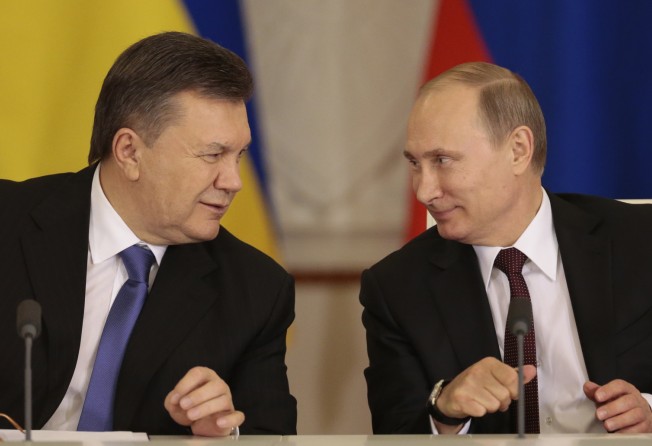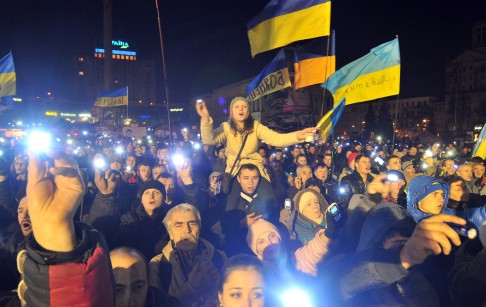Ukraine accepts US$15b Russian bailout
Opposition and protesters express outrage as anti-bankruptcy deal brings country closer to Moscow and away from EU

President Viktor Yanukovych on Wednesday faced angry criticism from Ukraine’s opposition who accused him of selling out the country’s interests to Russia and robbing the country of a European future after a landmark bailout deal.
Yanukovych has secured a US$15 billion bailout from Ukraine’s former Soviet master, offering respite for an economy heading ever closer to default.
The opposition feared there must be hidden strings attached to the US$15 billion bond purchase and low gas price – announced on Tuesday after hours-long talks with Russia’s Vladimir Putin – and they vowed to keep pushing for early elections.
“Yanukovych used Ukraine as pawn,” opposition leader and world boxing champion Vitaly Klitschko told the crowd of about 50,000 on Kiev’s Independence Square late on Tuesday, accusing the president of handing Ukraine’s industries to Russia as collateral in order to get the deal.
Russia will buy Ukraine’s debt in euro bonds and slash its gas bill by one-third as Kiev battles mass protests over the rejection of a historic European Union pact. The deal keeps Kiev firmly in Moscow’s orbit and out of the EU’s grasp.
Putin wants to bring Ukraine’s big, mineral-rich market into a Eurasian Union he plans to build with Kazakhstan, Belarus and other ex-Soviet republics to match the economic might of the United States and China. Without Ukraine, it looks much weaker.
The massive aid package was a surprise for European diplomats.
“Russian emergency loans to Ukraine risks further delaying urgent economic reforms and necessary EU modernisation,” Swedish Foreign Minister Carl Bildt tweeted. “Decline might continue.”
However, Prime Minister Mykola Azarov on Wednesday praised the bailout as a “historic” deal that would allow the ex-Soviet republic to revive economic growth.
“The president reached agreement on exceptionally beneficial conditions for crediting Ukraine’s economy, which allows us to carry out wide-ranging plans for economic modernisation,” Azarov also said during a government sitting.
Secret deals?

Tens of thousands of protesters gathered in Kiev on Tuesday after the announcement, and several hundred spent the night in the freezing cold. There was doubt minds about what exactly Yanukovych might have agreed to in secret.
Many of the protesters are angry Yanukovich has spurned an offer of closer co-operation with Europe and look on Russia with suspicion after living for decades under Soviet rule.
“I think the people will eventually have it their way. We will sign up to Europe. That’s why I’m here,” said Snezhana, a factory worker who spent the night on Kiev’s snowy main square.
Irina Litvinianko, a businesswoman, said: “It’s hard to imagine it could end up in anything else but a change of power.”
Opposition leaders have called for mass rallies over the holiday season on the central square occupied for weeks by protesters, who have pitched tents behind tall barricades.
“He has given up Ukraine’s national interests, given up independence,” Klitschko told the crowd on Tuesday.
Ukraine needs money to cover an external funding gap of US$17 billion next year – almost the level of the central bank’s depleted currency reserves – and avoid defaulting on its debts.
Underlining the depth of the problem, Russian Finance Minister Anton Siluanov said Moscow would buy US$3 billion worth of Ukrainian eurobonds as early as the end of this week, marking the first instalment of the debt purchases.
This is a rescue. Without that money, Ukraine would have defaulted ... next year
However, the United States warned Kiev that the deal would not satisfy the protesters, and German Chancellor Angela Merkel said ties with Russia should not prevent Kiev from looking West.
“At the moment it seems to be an either-or proposition. … We need to put an end to this,” Merkel told ARD TV. “A bidding competition won’t solve the problem.”
Russian Foreign Minister Sergei Lavrov told parliament on Wednesday that the West was continuing to put “overt pressure” on Ukraine.
Bandage, not remedy
Sitting side by side in a gilded Kremlin hall, Putin and Yanukovych bumped shoulders and laughed while documents were signed on reducing trade barriers for Ukraine.
In an apparent dig at demands made by the EU, Putin said Russia’s assistance was “not tied to any conditions” – including Ukraine’s accession to a Russian-led customs union of former Soviet republics.
“Ukraine is our strategic partner and ally in every sense of the word,” Putin said.
One stipulation is that Russia’s Gazprom has slashed the price Ukraine will pay for supplies to US$268.5 per 1,000 cubic metres from about US$400.
The deal boosted the price of Ukraine’s dollar debt.
“This is a rescue. Without that money, Ukraine would have defaulted some time before the middle of next year,” said Chris Weafer, senior partner with consultancy Macro-Advisory.
One analyst, Lilit Gevorgyan of IHS Global Insight, described the assistance as a “bandage but no remedy” for an economy that is heavily dependent on steel and agriculture and has struggled to modernise since the end of the communist era.